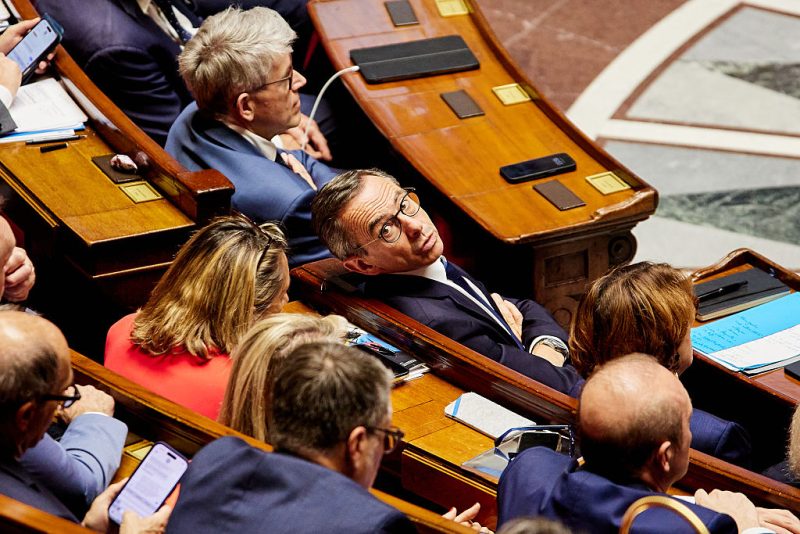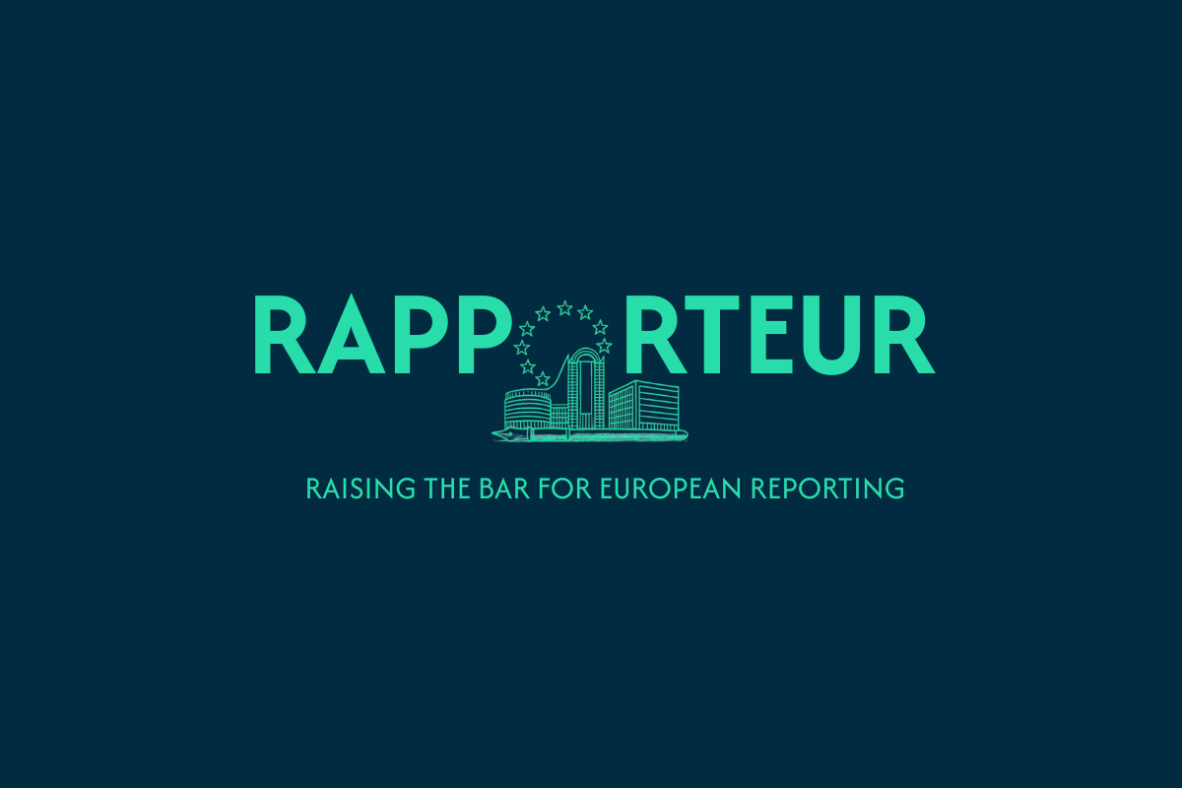Berlaymont on lockdown
In today’s edition: the Commission unveils its defence “readiness” plan amid fresh power struggles in Brussels, Dolors Montserrat admits to pocketing a €350 daily allowance from her EPP side job, and Euractiv scoops the Commission’s 2026 policy programme, revealing big ambitions – and a blank annex

URSULA’S BUNKER: Access to the 13th floor of the Berlaymont, where Ursula von der Leyen lives and her close circle works, will be severely limited from now on – even for commissioners and senior officials – according to an internal memo seen by Rapporteur. The top brass must now access their “conviviality salons” via the “purple elevators,” whatever that means … This is “13th floor fortress paranoia,” as one EU source termed it. It’s a fittingly defensive move for a day full of military announcements.
Welcome to Rapporteur. This is Eddy Wax, with Nicoletta Ionta in Brussels. Got a story we should know about? Drop us a line – we read every message.
Need-to-knows:
- The Commission will unveil its defence “readiness” plan
- Dolors Montserrat says she receives a €350 daily allowance from the EPP
- We scooped the Commission’s 2026 policy plans
From the capital
The EU’s strategy for fighting the Russians? Hit them with paperwork and metaphors. After the “White Paper” on defence in March, which announced a debatable €800 billion splurge as part of “ReArm”, today Ursula von der Leyen will deploy a new weapon of mass communication: the Readiness Roadmap.
As reported on Wednesday by our defence commander Aurélie Pugnet, it will announce the creation of four priority projects: Eastern Flank Watch, European Drone Wall, European Air Shield, and European Defence Space Shield – which is just as real as the EU Democracy Shield, if not more so. One stand-out ambition is for EU countries to jointly procure 40% of defence purchases by 2027.
There’s no fresh financial ammo being announced today. Instead, the Commission is leaning heavily on the €150 billion so-called SAFE loans, half of which is expected to be spent by early 2028. EU countries’ leaders will chew over it when they come to town next Thursday.
Adding to the machine gun of paperwork, Magnus Lund Nielsen scooped the Commission’s policy programme for 2026, which details several more defence initiatives. A new final compromise is in the making on a big EU fund called the Defence Industry Programme (EDIP), after a long scrap between those who want to prioritise European arms-makers and non-European ones.
For now, the real cash is being pledged up north at NATO, where just over half of members are pledging to buy US weapons for Ukraine under the new scheme set up to favour Trump, after a visit from US Secretary of Defence Pete Hegseth.
Which brings us nicely to the other fight that’s brewing. As von der Leyen tries to revive the long-dead notion of an EU defence union, there’s a tussle over who should hold fantasy operational command over the new policies.
According to early conclusions from next week’s European Council, the little-known European Defence Agency could be poised to take control of the joystick, Aurélie writes. Empowering this intergovernmental body shows that EU countries want the development of large-scale European projects on defence to remain in the hands of the member states, rather than to strengthen the Commission’s role. “I am the head of the EDA, so of course, I support this initiative,” Kaja Kallas – whose role sees her straddle both Commission and Council – said last night. Watch out, Ursula!
Scoop! Commission’s policy plans revealed
The Commission’s to-do list for 2026 – entitled “Europe’s Independence Moment” – will be unveiled next week in Strasbourg. The 30-page document, seen by Euractiv, sets out legislative plans on everything from agriculture to healthcare and defence.
Notably, the annex on planned withdrawals – which files the Commission looks to scrap – remains blank for now. Watch this space next week!
Euractiv Pro readers can learn more about the programme’s teased initiatives on tech, energy, health and defence.
EPP’s Montserrat admits she gets € from second job
After weeks of ducking Euractiv’s questions, Dolors Montserrat quietly updated her financial declaration on Wednesday to state she picks up a daily allowance of €350, plus travel expenses, when she does a day’s work as secretary-general of the EPP. The development begs the question of whether the entire €350,000 annual budget for the party leadership’s salaries is spent on Manfred Weber. Full story here.
French get away with censuring the Commission
There’ll be no consequences for the French part of the EPP, after senior MEP François-Xavier Bellamy voted to bring down the European Commission last week. At a group meeting on Wednesday Manfred Weber signalled his displeasure – according to two people at the meeting he called it a “huge challenge” – but stopped short of sanctioning the French. Blaming Emmanuel Macron for France’s mess, he said he understood his colleagues’ national context, and how von der Leyen is perceived by the French.
He instead tasked chief whip Jeroen Lenaers with drawing up a legal framework that will come up with consequences for MEPs who break three-line whip votes in future. The document should be ready in time for the next motion of censure, which according to Parliament’s rules, cannot come before December.
Fico drives car through Russia sanctions
Slovak PM Robert Fico said he is “not interested” in imposing more sanctions on Russia, and that EU leaders are focusing too much on Ukraine, as he continues to block Brussels’ 19th package. On Facebook, Fico insisted next week’s summit must conclude by demanding that the Commission to tackle the automotive crisis and high energy prices, which he said are making Europe “completely uncompetitive”. Is he merely posturing to gain leverage ahead of next week’s European Council? Thomas Møller-Nielsen has the story.
Commission teeters on budget ledge
The Commission could be on the verge of making an embarrassing U-turn on its budget proposal from July, under pressure from regional authorities and above all the European Parliament, where the EPP is close to all-out rebellion.
Several people I’ve spoken to this week suggested the Commission has signalled its willingness to amend parts of the budget proposal, or at least provide some fresh political guarantees about its most unpopular parts, from agriculture and regional funding to the governance model.
Jacob Wulff Wold, our budget reporter, has this blow-by-blow account on how the EPP is now openly threatening to topple the budget.
Petri Sarvamaa, a member of the Court of Auditors and former MEP, heaped more pressure on the Commission, telling Rapporteur that there is no way of checking how much is spent in the next EU budget. Read the full interview here.
How much red tape could a woodchuck chuck?
Some EU countries want changes to the not-yet-applied EU deforestation law, which is set to be postponed for a second year because of apparent IT issues. Environment Commissioner Jessica Roswall, as we recently reported, is already toying with the idea of “simplifying” the law, but we hear that’s not a universal view across the College. Several EU ambassadors called for tweaks to the law on Wednesday, Sofía Sánchez Manzanaro writes in to say.
The capitals
PARIS 🇫🇷
Two days after delivering his first speech before the National Assembly, Prime Minister Sébastien Lecornu faces two no-confidence motions today, tabled by far-left La France Insoumise and far-right Rassemblement National. The Greens and Communists have pledged to back LFI’s motion, while most Socialist MPs are expected to abstain, following Lecornu’s promise to suspend a controversial pension reform until the 2027 presidential election. However, the vote remains uncertain, as some Socialists may break ranks and several senior figures from Les Républicains, including MEP François-Xavier Bellamy, have called for the government’s fall, accusing it of aligning with the Left.
BUDAPEST 🇭🇺
Péter Magyar, the EPP lawmaker who is gaining ground against Viktor Orbán ahead of Hungary’s upcoming election, is accusing Olivér Várhelyi, Hungary’s EU commissioner, of not telling the full truth about espionage allegations linked to his time as ambassador to the EU in Brussels. Unsubstantiated media reports recently suggested that Várhelyi may have been involved in intelligence operations targeting the Commission – a claim he has denied. Hungary has denounced the allegations as part of a “smear campaign.”
ROME 🇮🇹
Foreign Minister Antonio Tajani told Parliament that Italy’s recognition of a Palestinian state is “now closer,” though still conditional on parliamentary criteria. Outlining a post-Hamas plan for Gaza, he proposed temporary international control, Arab involvement, and a future democratic Palestinian state mutually recognised with Israel.
MADRID 🇪🇸
The Supreme Court on Wednesday summoned former transport minister and ex-PSOE organisational secretary José Luis Ábalos over alleged “irregular and opaque income”, based on new evidence from the Guardia Civil in the ongoing “Koldo Case” corruption probe. Judge Leopoldo Puente allowed Ábalos to remain free after he exercised his right not to testify, but imposed precautionary measures, including a travel ban, passport withdrawal and mandatory court appearances every 15 days. The investigation, launched in 2024, targets a network of alleged rigged contracts, kickbacks and influence peddling involving Ábalos, his aide Koldo García and senior Socialist figures, including Sánchez ally Santos Cerdán, who remains in detention.
PRISTINA 🇽🇰
Ursula von der Leyen urged Serbia to “get concrete” about joining the EU during a visit to Belgrade, calling for progress on rule of law, media freedom and alignment with Russian sanctions. Serbian President Aleksandar Vučić has long balanced ties with Brussels, Moscow and Beijing, but with the country’s gas deal with Russia expiring this year and protests shaking his government, Brussels is turning up the pressure.
Also on Euractiv
France’s conservative party fractures over far-right flirtation
PARIS – France’s centre-right Les Républicains is edging towards implosion, as six party members accepted…
4 minutes

France’s conservative party Les Républicains is tearing itself apart as several members defied its leadership’s orders to join the Lecornu government, reviving a bitter fight over ties with the far right. With President Jordan Bardella’s Rassemblement National calling for a “union of the right” and party leader Bruno Retailleau accused of drifting toward Le Pen’s camp, France’s historic centre-right now faces its deepest identity crisis yet.
INTERVIEW: Cyprus says deals on migrant returns should be made at the EU level
Cyprus’ Deputy Migration Minister, Nicholas Ioannides, has called on the EU to coordinate efforts with…
4 minutes

Cyprus is pushing for migrant return deals to be handled at EU level rather than through national side deals, Deputy Migration Minister Nicholas Ioannides told Euractiv – as the island prepares to take over the EU Council presidency in January. In an exclusive interview, he said Nicosia is “optimistic” about bridging deep divisions over solidarity and relocation – and confirmed that EU countries are inching closer to agreeing on voluntary, and even forced, returns to Syria.
Agenda
📍 President Costa participates in the Festival of Politics and Ideas; meets the President of Montenegro, Jakov Milatovic
📍 Weekly meeting of the College of Commissioners followed by lunch; presentation of the Defence Readiness Roadmap 2030, the Pact for the Mediterranean and the EU Global Climate and Energy Vision
📍 Von der Leyen and Metsola speak at the Covenant of Mayors 2025 ceremony
📍 EPP political assembly meeting in Vilnius
Contributors: Sarantis Michalopoulos, Magnus Lund Nielsen, Thomas Møller-Nielsen, Elisla Braun, Charles Cohen, Alessia Peretti, Inés Fernández-Pontes, Aleksandra Krzysztoszek, Zuzana Gabrižová
Editors: Matthew Karnitschnig, Sofia Mandilara



